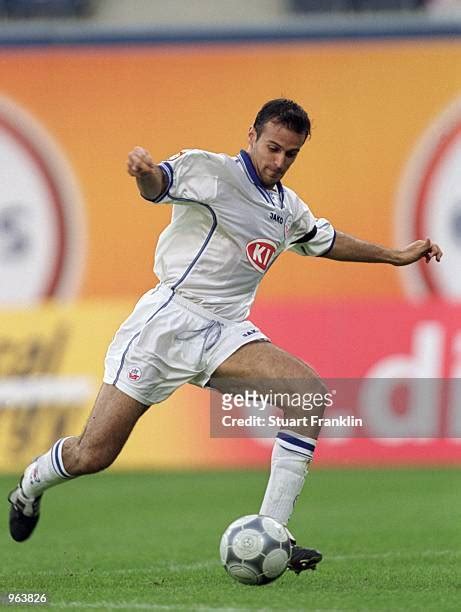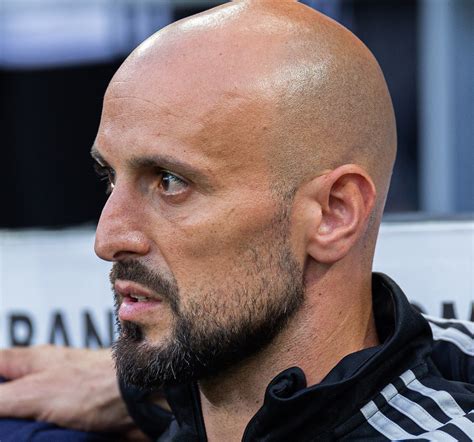
Antonio Di Salvo is a former Italian professional footballer who made a name for himself as a prolific striker, primarily in the German leagues. Born on October 5, 1979, in Paderborn, Germany, to Italian parents, Di Salvo’s career spanned over a decade and a half, marked by consistent goal-scoring and dedicated performances.
Di Salvo began his professional career with SG Wattenscheid 09 in 1998. His talent quickly became evident, attracting attention from bigger clubs. In 2000, he moved to Bayern Munich’s reserve team, where he further developed his skills. Although he didn’t break into the first team, his time there provided him with invaluable experience and exposure to a high-level training environment.
His breakthrough came with Hansa Rostock in 2002. He quickly established himself as a key player, scoring consistently and helping the team in the Bundesliga. This period solidified his reputation as a reliable goal scorer with a strong work ethic.
After two seasons with Hansa Rostock, Di Salvo transferred to TSV 1860 Munich in 2004. He continued to be a valuable asset, contributing significantly to their attacking play. Despite the team’s fluctuating form, Di Salvo remained a consistent performer, demonstrating his resilience and professionalism.
In 2007, Di Salvo joined Energie Cottbus. He spent several seasons there, becoming a fan favorite known for his determination and commitment on the field. He consistently contributed goals and played a vital role in the team’s efforts to compete in the Bundesliga and later in the 2. Bundesliga.
Later in his career, Di Salvo also played for Fortuna Düsseldorf and Rot-Weiss Ahlen, continuing to showcase his scoring ability and experience. He brought a wealth of knowledge and leadership qualities to these teams, contributing both on and off the pitch.
Throughout his career, Di Salvo was known for his strong aerial ability, clinical finishing, and tireless work rate. He was a dedicated team player who always gave his all, earning him respect from teammates, coaches, and fans alike. While he may not have achieved international recognition, his consistent performance and dedication in the German leagues cemented his legacy as a successful and respected footballer. After retiring from professional football, he transitioned into coaching, sharing his knowledge and experience with aspiring players.
 412×612 antonio salvo rostock premium high res pictures getty from www.gettyimages.com
412×612 antonio salvo rostock premium high res pictures getty from www.gettyimages.com
 461×612 antonio salvo rostock stock high res pictures from www.gettyimages.com
461×612 antonio salvo rostock stock high res pictures from www.gettyimages.com
 300×390 antonio salvo manager profile transfermarkt from www.transfermarkt.com
300×390 antonio salvo manager profile transfermarkt from www.transfermarkt.com
 440×293 antonio salvo playing friendly match editorial stock photo stock from www.shutterstock.com
440×293 antonio salvo playing friendly match editorial stock photo stock from www.shutterstock.com
 612×409 salvo premium high res pictures getty images from www.gettyimages.com
612×409 salvo premium high res pictures getty images from www.gettyimages.com
 440×293 portrait antonio salvo editorial stock photo stock from www.shutterstock.com
440×293 portrait antonio salvo editorial stock photo stock from www.shutterstock.com
 2500×2334 germany squad coach antonio salvo from bulinews.com
2500×2334 germany squad coach antonio salvo from bulinews.com
 2560×1707 antonio salvo backs mergim berisha succeed germany call from www.getfootballnewsgermany.com
2560×1707 antonio salvo backs mergim berisha succeed germany call from www.getfootballnewsgermany.com
 1126×1198 salvos juniors feature returners time call from bulinews.com
1126×1198 salvos juniors feature returners time call from bulinews.com
 540×432 salvo gibt vorlaufigen kader fur em bekannt bundesliga from www.bundesliga.com
540×432 salvo gibt vorlaufigen kader fur em bekannt bundesliga from www.bundesliga.com
 1200×630 antonio salvo wir glauben die qualitat des kaders from www.dfb.de
1200×630 antonio salvo wir glauben die qualitat des kaders from www.dfb.de
 1200×627 em trainer antonio salvo muss bei dfb team improvisieren from www.faz.net
1200×627 em trainer antonio salvo muss bei dfb team improvisieren from www.faz.net
 1200×630 bundestrainer antonio salvo beruft drei neue gmxat from www.gmx.at
1200×630 bundestrainer antonio salvo beruft drei neue gmxat from www.gmx.at
 0 x 0 antonio salvo wegen adeyemi kein fass aufmachen fussball news from sport.sky.de
0 x 0 antonio salvo wegen adeyemi kein fass aufmachen fussball news from sport.sky.de
 1440×810 ft junior erganzung auf dem platz mit antonio salvo news from fussballtraining.com
1440×810 ft junior erganzung auf dem platz mit antonio salvo news from fussballtraining.com
 2720×1530 kurzbiographie antonio salvo sportliche leitung sportl from www.dfb.de
2720×1530 kurzbiographie antonio salvo sportliche leitung sportl from www.dfb.de
 1000×750 lowen holen salvo bundesliga kicker from www.kicker.de
1000×750 lowen holen salvo bundesliga kicker from www.kicker.de
 768×432 em antonio salvo sieht klassenunterschied zur weltspitze from sport.sky.de
768×432 em antonio salvo sieht klassenunterschied zur weltspitze from sport.sky.de
 474×266 deutschland antonio salvo reagiert auf aus von hansi flick from sport.sky.de
474×266 deutschland antonio salvo reagiert auf aus von hansi flick from sport.sky.de
 0 x 0 antonio salvo aussert sich zur absage von dortmunds karim adeyemi from sport.sky.de
0 x 0 antonio salvo aussert sich zur absage von dortmunds karim adeyemi from sport.sky.de
 2048×1152 news antonio salvo benennt seinen ersten kader fussball news from sport.sky.de
2048×1152 news antonio salvo benennt seinen ersten kader fussball news from sport.sky.de
 1360×760 antonio salvo wir mussen den ball uber die linie drucken dfb from www.dfb.de
1360×760 antonio salvo wir mussen den ball uber die linie drucken dfb from www.dfb.de
 428×612 pauli stock high res pictures images getty images from www.gettyimages.com
428×612 pauli stock high res pictures images getty images from www.gettyimages.com
 704×396 speciale antonio salvo allena la nazionale tedesca il tema from www1.wdr.de
704×396 speciale antonio salvo allena la nazionale tedesca il tema from www1.wdr.de
 1024×731 coach antonio salvo germany prior uefa from www.gettyimages.com.br
1024×731 coach antonio salvo germany prior uefa from www.gettyimages.com.br
 1024×512 antonio salvo droht mit erstes vorrunden aus seit from www.nau.ch
1024×512 antonio salvo droht mit erstes vorrunden aus seit from www.nau.ch
 1000×562 antonio salvo gesprache das ist unser training kicker from www.kicker.de
1000×562 antonio salvo gesprache das ist unser training kicker from www.kicker.de
 1000×563 antonio salvo da geht mir das herz auf kicker from www.kicker.de
1000×563 antonio salvo da geht mir das herz auf kicker from www.kicker.de
 1000×563 salvo diese mannschaft ist nicht der titelverteidiger kicker from www.kicker.de
1000×563 salvo diese mannschaft ist nicht der titelverteidiger kicker from www.kicker.de